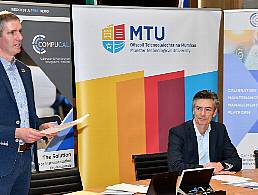Generation’s mission is all about ensuring everyone has access to education and skills, no matter where they live. The organisation has branches in Ireland, Kenya, Italy, Singapore, France, China, Thailand, India, Chile, Mexico, Australia and Spain.
Minh Huy Lai predicts that European employment markets will “continue to be volatile” over the coming months as wars and major elections dominate proceedings. Another destabilising factor is uncertainty about interest rates, meaning employers will likely continue to be cautious with their hiring plans, he reckons.
One way people can get ahead in a volatile employment market is to make sure they are constantly upskilling and keeping pace with new technology. Lai is the regional COO of Europe of the global education non-profit organisation Generation. He knows the European employment market very well and he has seen first-hand how Generation’s programmes have helped people attain employment and acquire new knowledge.
“At Generation, we select our learners based on their motivation and intrinsic skills rather than prior experience or diploma. This allows wide access to everyone who wants a life-changing career, regardless of where they are right now,” Lai explains.
“We use a skills-based approach in everything that we do, and we work with employers who hire our graduates to have them do so based on demonstrated skills and competencies rather than diplomas or prior experience.”
There is a Generation branch in Ireland, as well as in Kenya, Italy, Singapore, France, China, Thailand, India, Chile, Mexico, Australia and Spain. Its founder and CEO, Dr Mona Mourshed, launched Generation in 2015 after years of working in the education sphere.
She aimed to level the playing field for people who wanted to access employment – regardless of their country of origin. To date, the non-profit has helped more than 100,000 learners globally with its mix of soft skills, tech skills, online learning and practical boot camps.
Broadening access to skills for underrepresented people
Lai believes that if more employers were to adopt a skills-based approach, we would “have a broader access” to employment for all, “especially those coming from underrepresented backgrounds”.
“The way that governments and employers can address skills shortages in a meaningful and long-term way is by adopting a skills-based approach to training and hiring talent,” says Lai.
“This concretely means that we train people using industry and market relevant curriculum with a heavy dose of practicum, and it means that we hire people based on what they demonstrate that they can do rather than what they have done before or what diploma they have.”
Of course, there are skills shortages and employment inequality in wealthy countries, too. Just look at Ireland and some of the other traditionally better-off EU nations.
Deepika’s story
One graduate of Generation Ireland’s AWS re/Start programme told us that before she enrolled with Generation, she had battled for months to get a job.
Deepika already had a degree in computer science engineering and several years of work experience as a software developer and a coding teacher behind her by the time she moved to Ireland last year.
Like a lot of women, she had to take an extended break from IT due to family commitments. “When my husband and I moved to Ireland last year for his job, I wanted to get back to the industry I’m so passionate about but I was struggling to find a job in tech – I applied to so many jobs but barely heard anything back.”
Deepika felt overwhelmed. “Coming to a new country I didn’t know how the system worked in Ireland, including formatting a resume; it was all completely new to me. This led me to join Generation’s AWS re/Start program where I was able to obtain the technical and soft skills I needed to re-enter the workforce.”
She says that the main thing she gained from the programme was confidence. “More than anything, the confidence I gained from the experience was so important for me as I was so nervous having not heard back from countless roles I had applied for.”
“The positivity of the Generation mentors gave me and my fellow graduates a huge amount of motivation and the confidence to know that we can do it.”
While she did have a very solid grounding in tech, Deepika found that she was able to pick up new skills. “Having taken an extended break from IT, the technical skills I developed through Generation were also vital when it came to securing a job, especially learning Python.”
“We were also given the opportunity to meet with industry experts who gave us first-hand advice on the skills we should focus on and how to interview for a job effectively.
“Generation was also invaluable because it connected me not only with fantastic mentors from Ireland, but also with other people in a similar situation to mine where they were in a new country and didn’t know many people. I’m still friends with many of them and knowing others were experiencing the same problems as me did a huge amount for my confidence.”
Deepika has since got a job, and she says she would encourage people – especially those in the tech sector – to keep opportunities like Generation in mind for upskilling themselves.
For Lai, helping people like Deepika get back into the employment market is the reason he does what he does. “The common thread underpinning my career choices is being at an organisation where I can continue to learn and make a positive impact. My role at Generation delivers on both counts.”
Find out how emerging tech trends are transforming tomorrow with our new podcast, Future Human: The Series. Listen now on Spotify, on Apple or wherever you get your podcasts.




